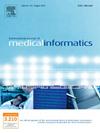Comparison of machine learning and logistic regression models for predicting emergence delirium in elderly patients: A prospective study
IF 3.7
2区 医学
Q2 COMPUTER SCIENCE, INFORMATION SYSTEMS
International Journal of Medical Informatics
Pub Date : 2025-03-22
DOI:10.1016/j.ijmedinf.2025.105888
引用次数: 0
Abstract
Objective
To compare the performance of machine learning and logistic regression algorithms in predicting emergence delirium (ED) in elderly patients.
Methods
A prospective study was carried out in a Chinese teaching tertiary hospital and collected the details of 1045 patients who underwent noncardiac surgery with general anesthesia. Characteristic variables related to ED were selected by least absolute shrinkage and selection operator (LASSO). Finally, seven machine learning models (gradient boosting machine, extreme gradient boosting, light gradient boosting machine, support vector machine, decision tree, neural network, and random forest) and logistic regression were used in the training set, and the predictive performance of the models was validated in the test set.
Results
ED was identified in 316 (30.2%) patients. The logistic regression model performed better than the machine learning models (area under the curve [AUC] of 0.790, 95% confidence interval [CI] 0.736–0.843). Besides, the calibration curve indicated good consistency between predicted and actual ED probabilities, and decision curve analysis demonstrated that the logistic regression model could bring clinical benefits.
Conclusion
The optimal application of logistic regression can provide rapid and efficient risk prediction of ED for medical workers so that reasonable prevention and treatment measures can be taken.
机器学习和逻辑回归模型预测老年患者突发性谵妄的比较:一项前瞻性研究
目的比较机器学习算法和逻辑回归算法在预测老年患者突发性谵妄(ED)中的性能。方法在某三级教学医院进行前瞻性研究,收集1045例全麻非心脏手术患者的详细资料。通过最小绝对收缩和选择算子(LASSO)选择与ED相关的特征变量。最后,将梯度增强机、极端梯度增强机、轻梯度增强机、支持向量机、决策树、神经网络和随机森林7种机器学习模型和逻辑回归应用于训练集,并在测试集中验证了模型的预测性能。结果有316例(30.2%)患者被确诊为糖尿病。逻辑回归模型的表现优于机器学习模型(曲线下面积[AUC]为0.790,95%置信区间[CI] 0.736-0.843)。校正曲线显示预测ED概率与实际ED概率具有较好的一致性,决策曲线分析表明logistic回归模型能够带来临床效益。结论logistic回归的优化应用可为医务工作者提供快速有效的ED风险预测,从而采取合理的预防和治疗措施。
本文章由计算机程序翻译,如有差异,请以英文原文为准。
求助全文
约1分钟内获得全文
求助全文
来源期刊

International Journal of Medical Informatics
医学-计算机:信息系统
CiteScore
8.90
自引率
4.10%
发文量
217
审稿时长
42 days
期刊介绍:
International Journal of Medical Informatics provides an international medium for dissemination of original results and interpretative reviews concerning the field of medical informatics. The Journal emphasizes the evaluation of systems in healthcare settings.
The scope of journal covers:
Information systems, including national or international registration systems, hospital information systems, departmental and/or physician''s office systems, document handling systems, electronic medical record systems, standardization, systems integration etc.;
Computer-aided medical decision support systems using heuristic, algorithmic and/or statistical methods as exemplified in decision theory, protocol development, artificial intelligence, etc.
Educational computer based programs pertaining to medical informatics or medicine in general;
Organizational, economic, social, clinical impact, ethical and cost-benefit aspects of IT applications in health care.
 求助内容:
求助内容: 应助结果提醒方式:
应助结果提醒方式:


